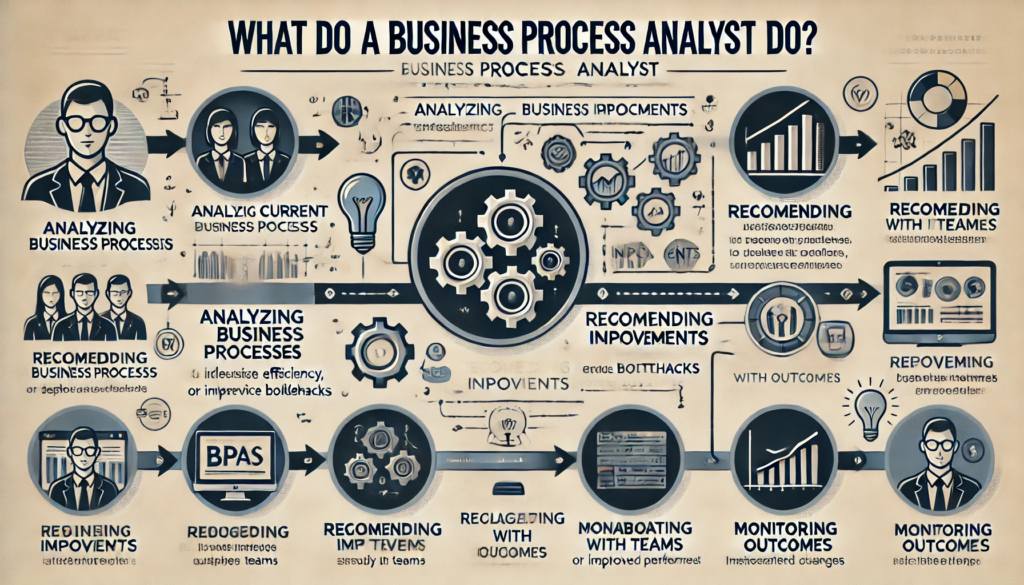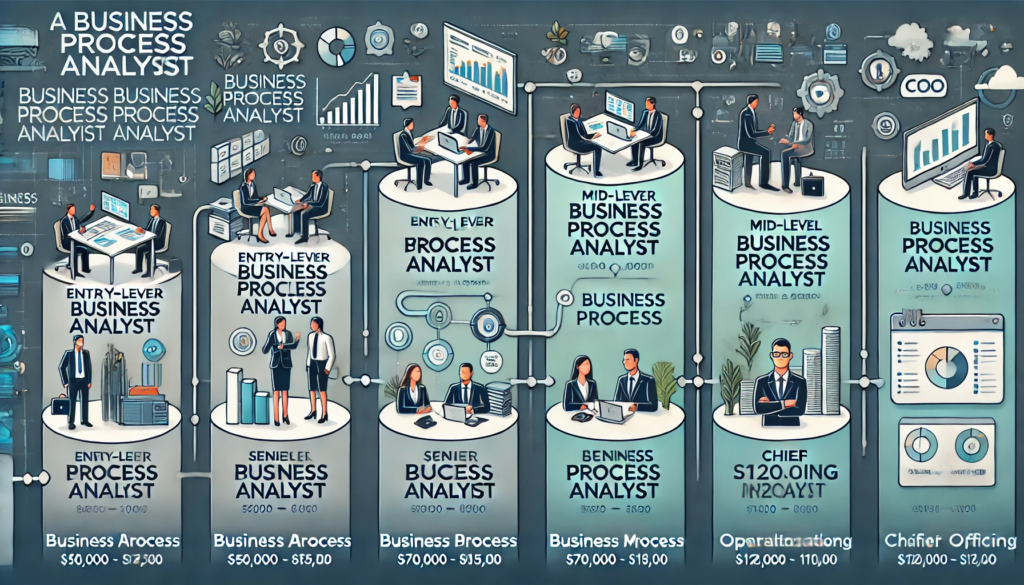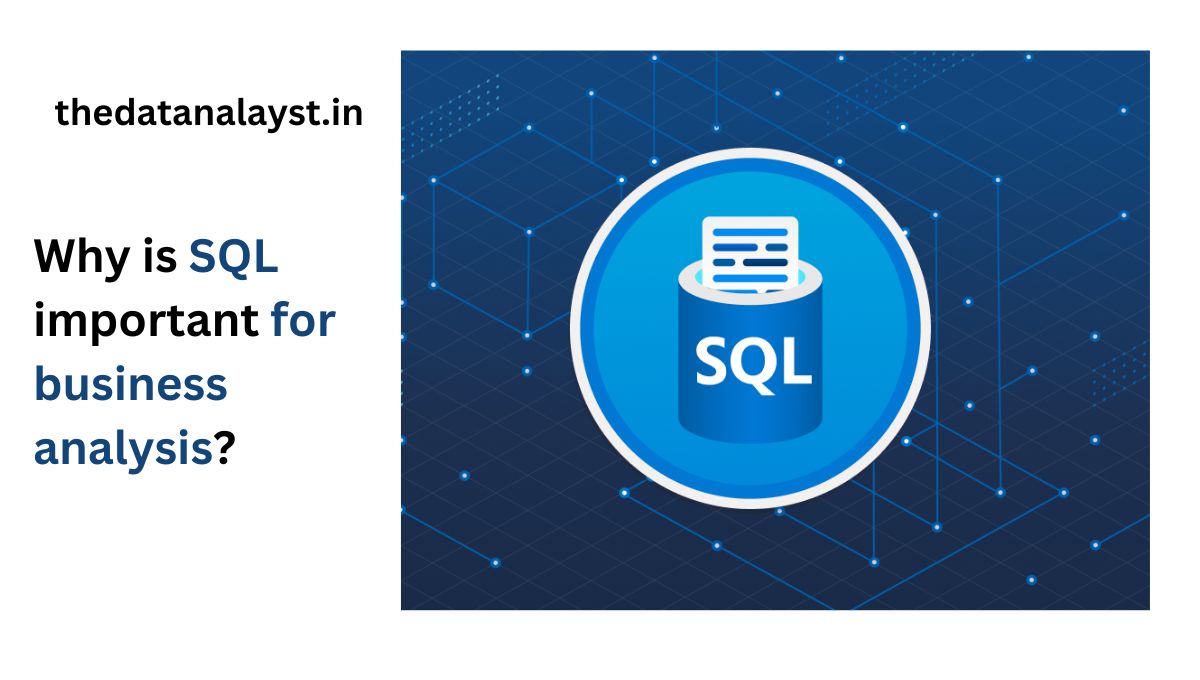
A Business Process Analyst (BPA) is someone who helps organizations improve efficiency by analyzing, designing, and optimizing their internal processes. If you’re good at problem-solving, strategy, and want to make a impact on company’s operations, this could be the perfect job for you.
In this article, we’ll cover everything you need to know about becoming a Business Process Analyst, including job descriptions, career hierarchy, skills required, salary, and more.
What Does a Business Process Analyst Do?
First get deep into the role we need to have a over view of what does a business analyst do and what is expected from him.
A Business Process Analyst works finds loop holes or errors in process and recommends improvements to smoothen the organization’s processes. Their role includes:

- Analyzing current business processes: He needs to study workflows and look for bottlenecks that are making an error on the system.
- Recommending improvements: Suggest changes to increase efficiency, reduce costs, or improve performance.
- Collaborating with teams: BPAs often work with different departments, like IT, operations, and management, to ensure changes have positive impact they align with business goals.
- Monitoring outcomes: After changes are implemented, BPAs track results to make sure they are achieving the intended improvements.
How Do Business Process Analysts Improve Processes?
So you just understood what does a business process analyst do now let us understand how they do it.
- Data Collection: First a business process analyst needs to collect data from available sources such as from employees, existing systems, and customer feedback forums etc.
- Process Mapping: Creates a flow chart to visualize and understand the working of the whole process.
- Gap Analysis: Now when they understand the process and understands the flow process they try to fight the gaps and errors in process.
- Solution Proposals: Once gaps are identified, a solution is need to be framed out for it by a business process analyst.
- Implementation & Monitoring: They help implement these changes and keep track of results to measure success.
Is Business Process Analyst a Good Career?
Although it completely depends on your interest and skills set but overall yes, becoming a Business Process Analyst is a rewarding and in-demand career.
Everyday businesses are constantly looking out for the ways to stay ahead of competition, so the need for professionals who can streamline processes is high.
Reasons Why Business Process Analyst Is A great Career
- High demand: With the rise of digital transformation, companies are focusing on improving their processes, making BPAs crucial to operations.
- Growth potential: BPAs can grow into higher roles such as Business Process Manager or even Chief Operating Officer (COO).
- Problem-solving: If you enjoy finding solutions and improving workflows, this job offers constant challenges.
- High salary: Depending on experience and location, BPAs are well-compensated , in USA as per glassdoor average salary for a BPA is $75382 .
Business Process Analyst Career Path and Salary
Now let us understand the salary and career path for a business process analyst.

Entry-Level Business Process Analyst:
- This is a entry level job and you will with a senior BPA or manager and help them with with data collection, analysis, and process mapping. This role focuses on learning the ropes and gaining foundational experience.
- Salary: $50,000 – $65,000 annually.
Mid-Level Business Process Analyst:
- After a few years of experience, you’ll take on more responsibilities, such as making recommendations for process improvements and leading smaller projects. At this level, you’ll start collaborating more with cross-functional teams.
- Salary: $70,000 – $85,000 annually.
Senior Business Process Analyst:
- As a senior analyst, you will oversee process improvement efforts across an entire department or division. You’ll lead more complex projects and be responsible for ensuring that optimization strategies align with the company’s goals.
- Salary: $90,000 – $110,000 annually.
Business Process Manager:
- In this role, you’ll manage a team of analysts and head big optimization initiatives. Your role will involve high-level decision-making and make sure that all departments are operating efficiently.
- Salary: $120,000+ annually.
Chief Operating Officer (COO):
- You are the big fish now you are the COO, and you are responsible for the overall operational strategy of the company. This involves managing multiple teams and ensuring all business operations run smoothly.
- Salary: $120,000+ annually.
Important Business Process Analyst Skills
To become the amazing Business Process Analyst, you’ll need a combination of technical and soft skills, including:
- Analytical thinking: You should be able to analyze complex data and workflows.
- Problem-solving: You must be good at finding issues and then providing a solution for them.
- Technical skills: Familiarity with process modeling tools (e.g., BPMN), data analysis, and sometimes coding.
- Communication: Strong skills in explaining processes to both technical and non-technical stakeholders.
- Attention to detail: Every detail matters when optimizing processes.
Business Process Analyst vs Business Analyst: Understand the Difference?
While both roles focus on improving business performance, there are key differences between a Business Process Analyst and a Business Analyst.
They differentiate from each other in following ways
- Focus: BPAs focus solely on internal processes, while Business Analysts (BAs) may work on a broader range of business issues, including product development or customer relations.
- Tools: BPAs often use specialized tools for process mapping, whereas BAs may use broader data analysis tools.
- Scope: BPAs typically have a narrower focus on processes, while BAs consider both process and strategy.
Things to Know Before Becoming a Business Process Analyst
- Certifications Can Boost Your Career: While certificates are not so important but not all certifications are made equal some make you standout , certifications like Six Sigma or Lean Management can make you stand out.
- Technical Skills Matter: Learning tools like Microsoft Visio or Lucidchart for process mapping can help you perform better in your role.
- Industry Knowledge is Crucial: BPAs often need to understand the industry they are working in—whether it’s finance, healthcare, or manufacturing—since processes differ by sector.
Conclusion: A Promising Path with Growth Opportunities
Becoming a Business Process Analyst is an excellent career choice for those who enjoy solving problems, improving business operations, and making impactful changes.
With a clear career hierarchy—from entry-level roles to top executive positions like COO—there are numerous opportunities for growth and advancement. The role not only offers competitive salaries but also the chance to work closely with key business functions, making you a critical player in an organization’s success.
Whether you’re just starting out or looking to advance in your career, the skills you develop as a Business Process Analyst are highly transferable and they will help you stand out from the crowd.

